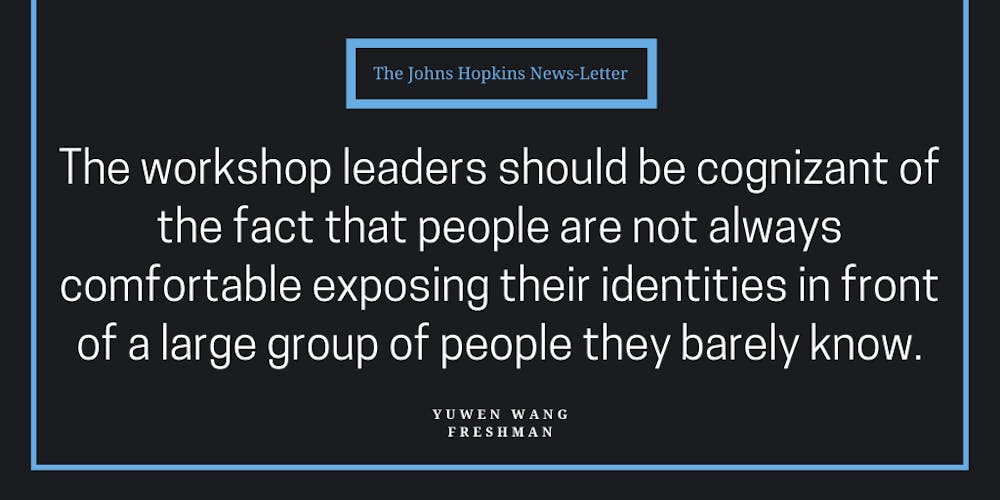As student facilitators begin to host this year’s Identity and Inclusion workshops, The News-Letter interviewed administrators and students on the impact that the workshops have had on the Hopkins community. All first-year and transfer students are required to attend an Identity and Inclusion workshop in the spring semester of their first year as a requirement for sophomore class registration.
The offices within Diversity and Inclusion (D&I) began the two-hour program in 2016 as part of an initiative to foster dialogue among students on racial awareness and diversity. These offices are the Office of Multicultural Affairs (OMA), Women and Gender Resources, LGBTQ Life and Religious & Spiritual Life.
Director Demere Woolway of LGBTQ Life, who helped to design the workshops, explained the process of planning activities in the workshop in an email to The News-Letter. She wrote that the workshop helped the D&I offices achieve many of their goals since its implementation three years ago.
“My sense is that students are more familiar with the diversity-related resources that exist at Hopkins, which is one of our learning outcomes,” Woolway wrote. “I think the other outcomes are harder to measure, but from conversations with students, I do get the sense that they are more aware of their own identities after participating in the workshop.”
Woolway explained that she believes these workshops are especially significant, considering most participants are teenagers possibly encountering individuals with different beliefs for the first time.
“It’s really important for everyone to be aware of their own subjectivity. In other words, we each have a set of perspectives and identities that we bring to the world. For first-year students who are about to have many new experiences, it’s especially important to reflect on how their experiences shape their worldviews,” Woolway wrote.
Students found that the workshop had a positive impact in helping them think about their own lives and experiences while considering the diverse backgrounds of their peers.
Freshman Hannah Yamagata stated that the workshop provided new ways for her to look at identity. However, she added that the workshop may have been too long.
“Because this was something that was very long and mandatory, it was not necessarily something that students were able to delve into the way it was intended,” she said.
Asimina Zoitou, a freshman from Greece, agreed with Yamagata’s sentiment. She commended the workshop for giving her a better understanding on how people from different countries perceived issues.
“It was very interesting because we had a chance to view other opinions about questions on diversity and inclusion that I might have never thought about before,” Zoitou said.
As part of the workshop, students discussed the significance of finding safe and brave spaces in order to best adapt to the new college environment while also finding growth opportunities. Safe spaces are areas where students should feel comfortable and accepted, while students might feel challenged in brave spaces.
Freshman Rose-Alice Duverna said she believed the Identity and Inclusion workshop helped her understand the separation between “safe spaces” and “brave spaces.”
“It really made me think of my identity and reminded me of where I am most comfortable and can be myself,” Duverna said.
Yuwen Wang, also a freshman, stated that although she believes the workshops were designed with good intentions, she had a few misgivings. She stated that she felt as though there were moments where the facilitators encouraged the students to complete certain tasks in order to finish the workshop sooner.
“Before asking people these questions about their identity, the workshop leaders should be cognizant of the fact that people are not always comfortable exposing their identities in front of a large group of people they barely know,” Wang said.
Yamagata shared Wang’s belief that the workshops could be more effective if they were more private.
“I would make it... something where we don’t have to express our insecurities in front of a large group of people,“ Yamagata said. “Maybe write it down on a piece of paper.”
Woolway noted that D&I improving the workshops is a continuous process.
“We have taken feedback from student participants as well as from our facilitators in order to improve the flow and clarity of the different activities,” Woolway wrote. “We will continue to look at the evaluations in order to ensure that we have a positive impact on students.”
Editor’s Note: This article has been updated to include Religious & Spiritual Life as one of the offices that began the Identity and Inclusion workshops.





